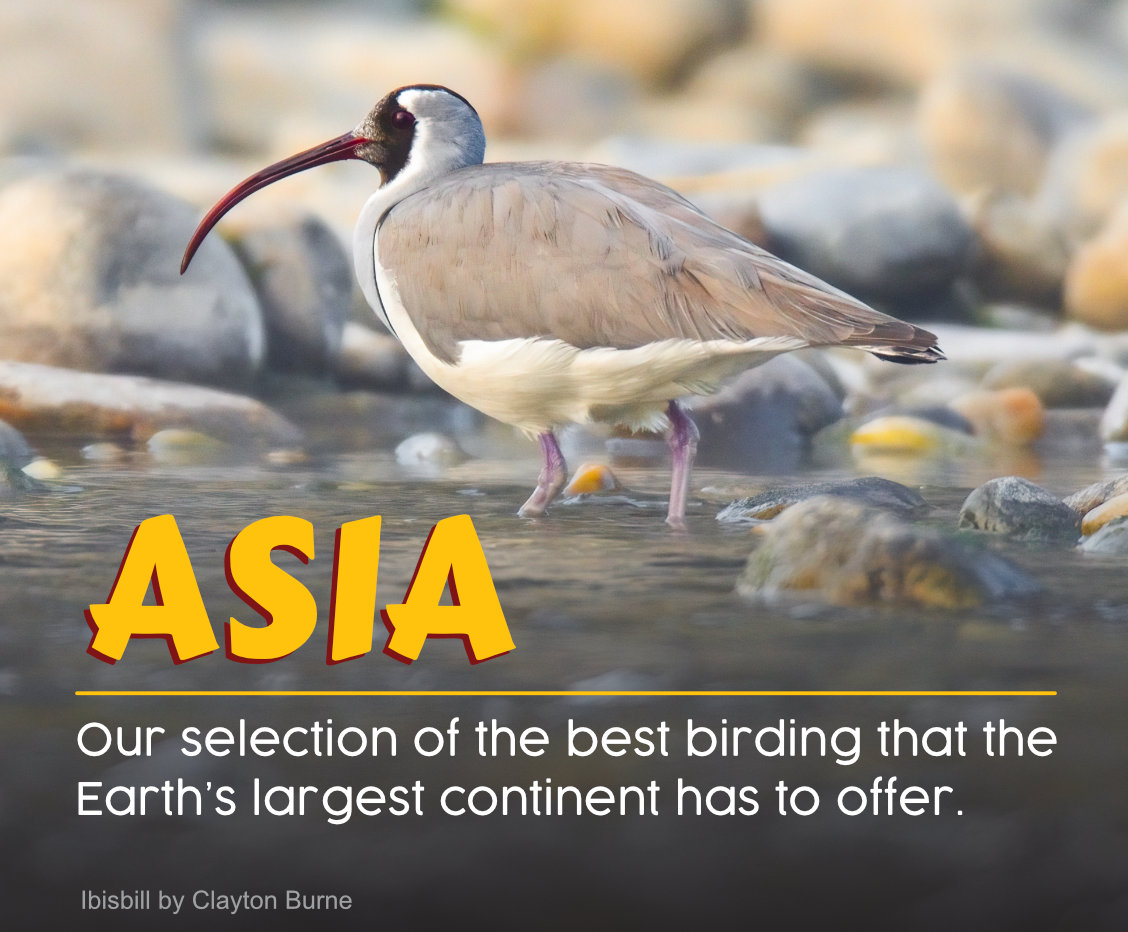
Asia birding can be divided up into four biogeographical realms, the Oriental, Palearctic, Afrotropical and Australasian. This results in extreme geographic and habitat diversity across the continent, from the coldest Arctic of Siberia to the famous Gobi Desert of Mongolia and much in between. Spread across these fantastic regions, is a breath-taking list of over 3,800 bird species. This extensive list contains a great number of sought-after species and monotypic families. Our tours below are orchestrated in such a way, to give the best possible chance of seeing these species as well as make the most of the beautiful places in which to find them.

India is home to twelve percent of the worlds bird species (a list of over 1350 birds), this extensive list of species includes some fantastic species like this monotypic Grey Hypocolius.
India’s ecosystems range from the humid evergreen forests of the north-east, the stunning Himalayas to the north, and jungles and wetlands of the central plains to the beautiful Western Ghats mountains in the south-west and the scorching deserts adjacent to Pakistan in the west. Each of these biomes contain their own special set of species, distributed across over 500 wildlife sanctuaries and more than 550 Important Bird Areas.
As well as the Grey Hypocolius, India supports several other highly sought-after monotypic families like Ibisbill, Wallcreeper, Crab-plover and Spotted Elachura.
It is not just birds that feature prominently on our tours to India, a plethora of stunning wildlife such as Bengal Tiger, Greater One-horned (Indian) Rhinoceros, Gharial, Asiatic Lion, Indian Leopard, Gaur (Indian Bison), Asian Elephant, and so much more can all be enjoyed too. On some of our tours we even make specific effort to look for some very localised animals like Red Panda, Snow Leopard, Blackbuck and Lion-tailed Macaque.
Join us on the following adventures that set out to make the most of what this most spectacular region has to offer.

Sri Lanka is undoubtedly one of the most biodiverse regions in South Asia. It is home to an incredible 34 endemic bird species which are dispersed throughout the spectacular island scenery of lowland and montane rainforests, grasslands, wetlands, mountains, and saltpans.
Sri Lanka is also a fantastic destination for mammals with a notable selection of big and small game! These include the likes of the Asian Elephant, Sloth Bear, Leopard, Red Slender Loris, Purple-faced Langur and many more.
Sri Lanka is one of just a few countries where it is possible to observe all the endemic birds as well as some other spectacular species, like this gorgeous Sri Lanka Blue Magpie, in just one trip! Join us on this adventure through national parks, bustling with birds and animals, experience magical culture throughout the towns on our way, and enjoy the exotic cuisine and comfortable accommodation in this dream destination.

Mongolia is second only to Kazakhstan as the largest landlocked country in the world. This incredible amount of space offers some of the most pristine areas left on the planet including rich Siberian taiga forest, vast seamless steppe grassland, numerous freshwater and brackish lakes, the Gobi Desert, and spectacular mountains, all holding a unique and wonderful array of life.
Just some of the notable species occurring throughout these environments are these elegant Demoiselle Cranes, Bar-headed Goose, Black-billed Capercaillie, Altai Snowcock, Ural Owl, Amur Falcon, Saker Falcon, Cinereous Vulture, Upland Buzzard, Oriental Plover, and many more!
As well as these avian delights, Mongolia presents a set of mammalian highlights, none more famed than the elusive Snow Leopard, but still undeniably worth mentioning are the Siberian Ibex, Saiga, Goitered Gazelle, wild Bactrian Camel, Mongolian Wild Ass, and Przewalski’s Horse. Thanks to 250 clear sunny days a year, excellent photographic and viewing opportunities will present themselves.
Mongolia certainly makes an amazing destination for adventure and has something to offer anyone who visits with interesting mammals, amazing birds, broad vistas and even fascinating historical evidence of early human habitation!

Comprising of six distinct geographical regions, Thailand’s habitats range from impressive mountains in the north, draining into the mighty Mekong River, through tropical savanna and a range of forest types, hosting a mind-bending array of colourful bird species, like this incredible Coral-billed Ground Cuckoo. South to saline shallow water environments, hosting a special variety of waders and the narrow Isthmus of Kra, where a great number of migrating raptors can be found.
Thanks to Thailand’s popularity as a top birding destination for the past 50 years, a fantastic infrastructure for visiting birders has been developed. With a species list of just over 1,080 birds, there’s no surprise as to why it has been so popular for so long! On this list perch a fabulous number of avian delights that include the likes of Eared and Blue Pittas, Siamese Fireback, Mrs. Hume’s Pheasant, Black-headed Woodpecker, Nicobar Pigeon, and Giant Nuthatch.
Thailand provides one of Southeast Asia’s richest bird species lists and is one of the very best countries on Earth to see the fascinating but Critically Endangered, Spoon-billed Sandpiper and other mega shorebirds like Nordmann’s Greenshank and Asian Dowitcher.
Visit this dream birding destination with us as we journey across Thailand’s many habitats in search of as many of the regions beautiful species as we can find.

One of the most biodiverse destinations in the world with a high degree of endemism, the Philippines is a top birding destination in Southeast Asia. The country is made up of over 7,600 islands, collectively covering an area of over 1,500 kilometres in the tropical climate of the western Pacific Ocean.
Of the 722 species that occur here, an impressive 223 are endemic. This amazing list of endemics includes this vibrant Philippine Trogon and the national bird of the Philippines, the huge, Philippine Eagle. Unfortunately, the forests here are being removed at such a rate that 96 species that occur in the region are considered globally threatened. The list of the top birds that occur here is extensive and some of the prized specials include Philippine Frogmouth, Philippine Cockatoo, Azure-breasted Pitta, Rufous Hornbill, Spotted Wood Kingfisher, Bukidnon Woodcock, Apo Myna, Giant Scops Owls, Stripe-headed Rhabdornis and Scale-feathered Malkoha.
There is no denying that the endemic habitats of the Philippines are under major pressure making this country a priority destination, given the overall number of highly threatened species. Our tours listed below have been crafted over many years of field observation and visit the very best sites for the country’s prime targets.

Vietnam is a nature enthusiasts paradise, home to over a dozen endemic bird species and many potential future splits.
A range of habitats are present across the country, from lowland evergreen forest, bamboo groves, wetlands, semi-evergreen forest, and montane evergreen forest, in which reside some of the most incredibly plumed avian life. Just two examples would be this dazzling Bar-bellied Pitta and Germain’s Peacock-Pheasant.
Our tours set out to see some of Vietnam’s most seldom-encountered avian specialties, including the near-mythical Chestnut-eared Laughingthrush, recently discovered Black-crowned Barwing, as well as localized endemics and global rarities such as Collared and Orange-breasted Laughingthrush, Yellow-billed Nuthatch, Short-tailed Scimitar Babbler, Dalat Shrike-Babbler, White-winged Magpie, Grey-crowned Crocias and Mekong Wagtail.
Incredible viewing and photographic opportunities will most certainly present themselves with great bird species as well as some quality mammals like Leopard Cat, Lesser Oriental Chevrotain, Gaur and three beautiful primates, Black-shanked Douc Langur, Silvered Lutung and Northern Yellow-cheeked Crested Gibbon. We invite those with a taste for the exotic to come and explore this incredible country with us.
